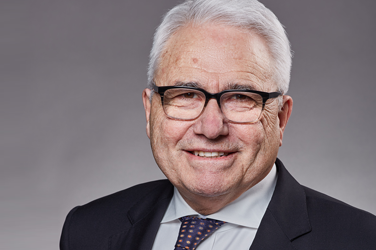When he took office on January 29, 2018, Raymond Théberge became Canada’s first Commissioner of Official Languages from a province other than Ontario or Quebec. Get to know this Franco-Manitoban with a passion for language in an interview he gave to the Our Languages blog team.
His passion, his career path and the influences that have shaped him
Our Languages blog (OLB): Your studies and career path reflect a deep passion for official languages. Where does this passion come from?
Raymond Théberge: I often say that who we are is primarily influenced by where we come from. I was born in a small town called Sainte-Anne-des-Chênes, in Manitoba, and I can say that it was a very active community. My mother was part of a movement to establish a French school in the town. My family talked a lot about it around the table, at home. My passion for languages came naturally; I’ve always been interested in words, which explains my choice of a career in linguistics.
I belong to the generation that saw the advent of the Royal Commission on Bilingualism and Biculturalism, the Official Languages Act and the recognition of our Francophone identity.
OLB: You’ve held many positions throughout your career, a career that could almost be called a “mission” to defend minority official languages. Is it important for you to work in an official language minority community?
Raymond Théberge: The situation has changed significantly over the last 50 years. Back then, we simply called ourselves French Canadians. Later, the Francophonie expanded to include the Francophone regions of Canada, and we started identifying as Franco-Manitobans, Fransaskois, Franco-Albertans, etc.
I completed part of my studies at McGill University, and it was when I returned to Manitoba that I really became aware of the reality that I was a member of an official language minority community (OLMC). OLMCs became a subject of research for me: I wanted to understand the way they worked, their vitality, their development. I thought it was important to have an in-depth understanding of them, so I met with Canadian researchers.
In this way, I learned about many facets of language in Canada: the challenges facing Anglophones in Quebec are different from those faced by Francophones outside Quebec, and Acadia has gone through quite a transformation. Over the years, I developed networks and made contacts. I worked in linguistics, and I never imagined I would one day become Commissioner of Official Languages!
OLB: Did you have a mentor? Someone who inspired or influenced you?
Raymond Théberge: Many teachers influenced my career path. In high school and college, they were committed and pushed us to excel. I had several mentors. One person who comes to mind is my thesis advisor at the University of Ottawa, who urged me to do my PhD in linguistics. He helped me to further develop my thinking about language communities. After my studies, I was offered my first position in a government department in Manitoba and, there again, I received a lot of support. I went back home, back to my roots, to contribute to my community.
Let’s talk about linguistic duality
OLB: What will be your first priority during your term as Commissioner of Official Languages?
Raymond Théberge: To increase engagement on the part of the public service with respect to official languages. We must ensure that it becomes easy to use and learn official languages in the workplace. By educating public servants in this way, we are reiterating our commitment to offer services to Canadians in both English and French.
OLB: In your view, what is the key ingredient for maintaining the balance between the two official languages?
Raymond Théberge: To maintain linguistic duality in Canada, we need two key ingredients: respect and recognition. And that means equality of both official languages. We must allow the use and visibility of both languages. Doing so is part of our Canadian identity and international reputation. For example, I recently participated in a discussion forum in Kosovo to talk about the importance of official languages as a communication tool and as a pillar of a people’s identity. Canada is known for its official languages, and they are truly part of the country’s identity.
OLB: As a linguist, do you think that the expression “linguistic duality” could be subject to change?
Raymond Théberge: Dialogue on duality has changed considerably since 1969. Before we started using the term, we talked about official bilingualism. Later, we spoke of official languages. Now, we talk about linguistic duality. You know, the environment is constantly changing. So I think it’s appropriate for the terminology to change as well. It must reflect Canada’s character.
OLB: In closing, Mr. Théberge, what message would you like to share with Canadians about the country’s linguistic duality?
Raymond Théberge: Linguistic duality is a fundamental value. It is the pillar of society. Language involves diversity and inclusion. These are recognized rights. We are entering a new era of reconciliation, and language is part of it.
We must never forget that linguistic duality has always been and will always be a part of Canada.
Translated by Line Lalande, Language Portal of Canada

